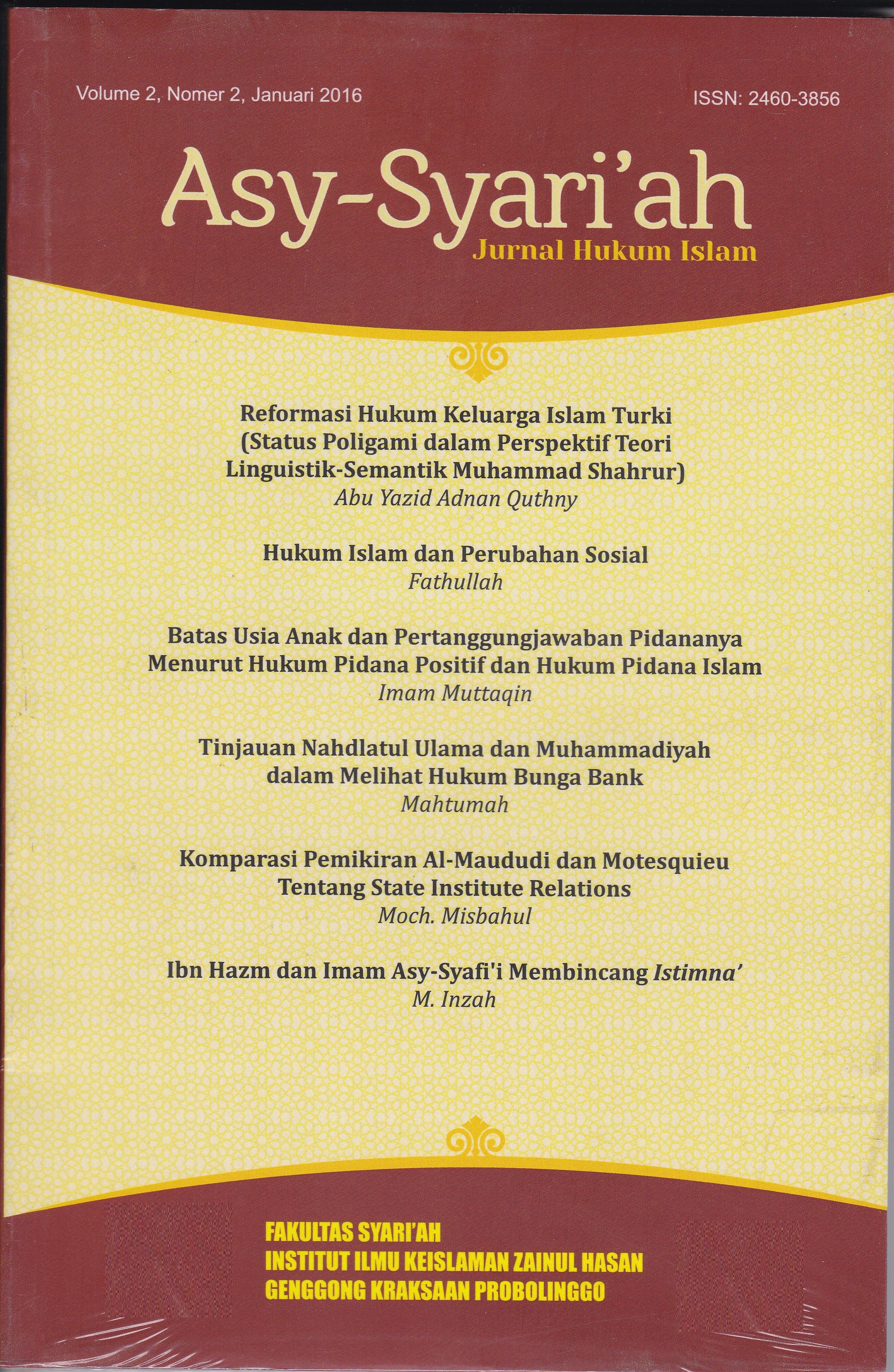Reformasi Hukum Keluarga Islam Turki (Status Poligami dalam Perspektif Teori Linguistik-Semantik Muhammad Shahrur)
Abstract
Renewal of Islamic law in the form of family law legislation began in 1917 with the passing of the Ottoman Law of Family Rights by the Government of Turkey. Family law reform in Turkey was a milestone in the history of family law reform in the Islamic world and has a great influence on the development of family law in other countries. Muhammad Shahrur is one of the contemporary Islamic legal thinkers who did the understanding of Islamic law by way of hermeneutics. One popular method is the analysis of linguistic semantics, and application of modern exact sciences. according Shahrur, marriage principles in the Qur’an are monogamous. While the letter an-Nisa ’verse 3 is often used as the basis of legislation of polygamy actually talking about guardianship of orphans. Therefore, according to the terms Shahrur allowed polygamy (1) wife of second, third, and fourth are widows who have children orphaned, and (2) there must be a sense of worry can not do justice to the orphans. As well as engagement in the Turkish Civil Code of 1926 and arranged in chapters 82-87 in The Cyprus Turkish Family Law of 1951 stipulated in Article 4-5. Turkish family law encourages courts to not hold a special agreement before the marriage, that is to say, if there is a cancellation of the wedding, then judged based on state laws (depending on the law, not a specific agreement between the person who is engaged). If the engagement party is already done, and it turns out the marriage covenant void, then the parties considered responsible for the cancellation of any obligation to pay compensation in the form of changing the party who has incurred costs.This study will discuss the history of the Turkish family law reforms and the factors that influence since Ottoman times to become the Republic of Turkey was formed, explains the elements of a Turkish family law reform, and then associate one element of a Turkish family law reforms (polygamy) with analytical thinking Shahrur linguistic semantics.
References
Ahmed, Akbar S., Citra Muslim: Tinjauan sejarah dan Sosiologi, alih bahasa Nunding Ram dan H. Ramli Yakub, Jakarta: Erlangga, 1992.
Ahmed, Akbar S, Discovering Islam, Making Sense of Muslim History and Society, London&New York: Routledge&Kegan Paul, 1988.
Ahmed, Akbar S, Living Islam: from Samarkand to Stornoway, New York: Facts on File, 1994.
Amir, Dja’far, Ilmu Fiqih , Solo: Ramadhani, 1986.
Anderson, J.N.D., Hukum Islam di Dunia Modern, alih bahasa Machnun Husein, Surabaya: Amarpress, 1990.
Anderson, J.N.D., Islamic Law in the Modern World , New York: New York University, 1959.
Ayyub, Syaikh Hasan, Fikih Keluarga, Jakarta: Pustaka Al-Kautsâr, 2006.
Darajat, Zakiah, Ilmu Fiqh II , Jakarta: Dana Bhakti Wakaf, 1995.
Desmita, Psikologi Perkembangan, Bandung: PT. Remaja Rosdakarya, 2005.
Gupta, Kiran, “Polygamy Law Reform in Modern Muslim States: A Study in Comparative Law,” dalam Islamic and Comparative Law Review, vol. xii, no.2, ttp.: Summer, 1992, hlm. 114-154.
Habsyi al-, Muhammad Bagir, Fiqih Praktis Menurut al-Qur’an, al-Sunnah dan Pendapat Para Ulama’, Bandung: Mizan, 2002.
Hâkim, Abdul Hamid, Mabâdiu Awwaliyyah, Jakarta: Sa’adiyah Putera, tt.
Hutabarat, Herbert, dkk., Naskah Lengkap Kongres Obstetri dan Genekologi Indonesia Ketiga, Medan: KOGI, 1976.
Idris, Abdul Fatah dan Abu Ahmadi, Fiqih Islam Lengkap, Jakarta: Rineka Cipta, 1994.
Islam, M. H. (2015). THORNDIKE THEORY AND IT’S APPLICATION IN LEARNING. Attalim, 1(1), 37-47.
Isroqunnajah, “Hukum Keluarga Islam di Republik Turki,” dalam M. Atho’ Muzdhar dan Khoiruddin Nasution (ed.), Hukum Keluarga di Dunia Islam Modern , Jakarta: Ciputat Press, 2003, hlm. 36-52.
Jackson, Sherman A., Islamic Law and The State: The Continental Jurisprudence of Shihâb al-Dîn al-Qarâfî , Netherland: E.J. Brill, 1996.
Jazîrî al-, Abd al-Rahmân, al-Fiqh ‘alâ Madzâhib al-Arba’ah, Beirut: Dâr al-Fikr, 1989.
Kamus Ilmiah Populer, Pius A. Partanto dan M. Dahlan Al-Barry, Surabaya: Arkola, 1994.
Lapidus, Ira M., Sejarah Sosial Ummat Islam; Bagian Ketiga, alih bahasa Ghufron A. Mas’adi, Jakarta: PT. Raja Grafindo Persada, 1999.
Lewis, Bernad, The Middle East: A Brief History of The Last 2000 Years , New York: Scribner, 1996.
Maghlûts al-, Sami bin Abdullah, Atlas Perang Salib: Mengungkap Peristiwa Berdarah Abad Pertengahan, alih bahasa Fuad Syaifuddin Nur, Jakarta Timur: Almahira, 2009
Mughniyah, Muhammad Jawad, Fiqih Lima Madzhab: Ja’farî, Hanafî, Malikî, Syafi’î, Hanbalî, alih bahasa Masykur A. B. dkk., cet. Ke-10, Jakarta: PT. Lentera Basritama, 2003.
Muslehuddin, Muhammad, “Islamic Social System,” dalam Studies in Islamic Law, Religion and Sosiety, New Delhi: H.S. Bathia, 1989, hlm. 334-347.

